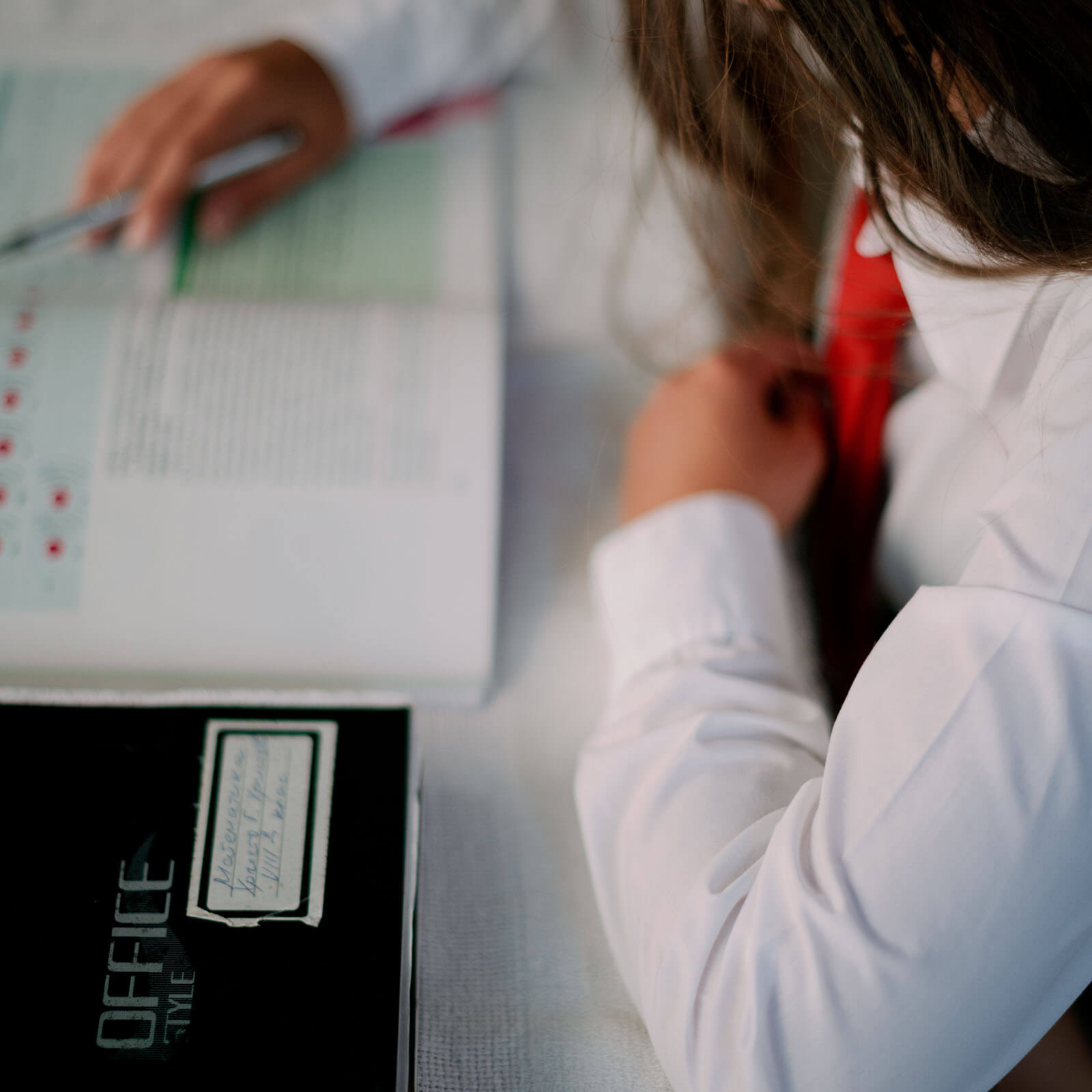Undergraduate Registration
Online Students
Summer 2024 Registration Information
The Summer 2024 Semester runs from May 6 to August 16, 2024. We are open for course registration from March 18th until April 26th, 2024. Please register during this timeframe to save your spot and avoid the $50 late fee.
Meet Your Advisor
All Undergraduate Students must register through their advisor,
Schedule Your Appointment:
Ms. Ryleigh Myers
rmyers@holyapostles.edu
Registration/Advising Appointment Booking website:
https://hacsstudentsuccess.youcanbook.me/
Please refer to your personalized degree plan provided by your advisor.


Forms and Annual Listing
Course registration is a seamless process. Please click the button below to access the undergraduate registration form.
Please refer to our helpful Annual Listing so you can plan out when your courses will be offered each semester. This listing is updated regularly so please be sure to review it periodically.
Undergraduate Syllabi
For materials that you will need to purchase for your course, please see the course syllabus. Please note that it is your responsibility to purchase all materials prior to the start of classes. Please note that in order to view each syllabus on the website, you must be logged into your Holy Apostles email account for access to our Google Drive.
If a syllabus is unavailable to view, it is possible that it is currently undergoing updates and will be live again shortly.
Summer 2024 Syllabi & Course Descriptions
ENG 131 Poetry Prof. Daniel Spiotta
This course introduces students to classics in poetry. Special focus will be given to close-reading and interpretive skills of representative authors.
ENG 151 Drama Prof. Cynthia Gniadek
This course studies significant works of drama. Particular attention will be paid to Western dramatists.
ENG 221 Novels, Short Stories, and Literary Research Prof. Cynthia Gniadek
This course examines select novels and short stories. Each student will write a paper on a work of literature with guidance through the research and drafting processes.
HIS 101 Western Civilization I Dr. John Bequette
This course covers the history of Western civilization from the dawn of civilization through the Council of Trent. The intent of this course is for the student to develop an understanding of both the flow of history as an integrated whole, as well as an understanding of the significant part played by the Catholic Church in building Western civilization.
HIS 201 American History I Dr. John Carter
This is the first of a two-course sequence in U.S. history that covers the founding of the British colonies in North America through the election of 2000. This course examines the process of colonization, the Revolutionary War, the growth of the American Republic, the issues that led to the secession of the South, the conduct of the Civil War, and the struggle to reconstruct the nation.
HIS 352 Eastern Civilization II Prof. Lucy Underwood
This course complements Eastern Civilization I by chronologically tracing the history of East and Southeast Asia from ancient times to modern times. In so doing, students learn about cultures, philosophies, and religions of East Asia. The course pays special attention to the role of Catholicism in East Asian history.
HUM 104 Humanities in the Early Christian Church and Medieval World Dr. John Bequette
This course covers the emergence and spread of Christianity as primary cultural phenomena from the time of Christ until the late middle ages, and introduces the major branches of the humanities– for example, the literature, philosophy, arts, and architecture.
LAT 203 Latin III: Advanced Latin Dr. Philippe Yates
This course transitions from learning the grammar and basic vocabulary to translating significant texts of ecclesiastical Latin. This course builds on LAT 201 and LAT 202.
MTH 300 Introduction to Moral Theology Prof. Paul Chutikorn
This course introduces the foundational concepts of Catholic moral theology, and seeks to provide a mastery of the questions: What is moral theology? What are its underlying precepts? How can we use these to help ourselves and others lead a moral life?
MTH 425 Theology of the Body Dr. Lucy Knouse
This course covers the biblical foundations for the Theology of the Body as expressed in the works of St. John Paul II, and seeks to relate the Theology of the Body in the practical encounters of life, love and Marriage.
PAS 161 Catechism I Prof. Steven Schultz
This course presents an overview of the Catechism of the Catholic Church. Students study the first two parts, “The Profession of Faith” and “The Celebration of the Christian Mystery” to grasp its presentation of truth in the light of Vatican Council II.
PAS 162 Catechism II Prof. Steven Schultz
This course presents an overview of the Catechism of the Catholic Church. Students study parts three and four of the Catechism, “Life in Christ” and “Christian Prayer,” to grasp its presentation of truth in the light of Vatican Council II.
PHE 450 Ethics Prof. Paul Chutikorn
This course studies the principles of ethics from a Thomistic and phenomenological perspective including criteria for making moral choices and a refutation of situation ethics, and addresses social justice, abortion, war and peace and sexual ethics.
PHH 301 History of Ancient Philosophy Dr. Peter Mango
This course studies the most representative thinkers of ancient philosophy, beginning with Plato, Socrates and Aristotle and ending with St. Augustine and Boethius.
PHH 304 History of Medieval Philosophy Dr. Jonathan Kirwan
This course will introduce students to medieval philosophy and, in addition to focusing on major thinkers such as Augustine, Boethius, Anselm, Thomas Aquinas, Bonaventure, Duns Scotus, and William of Ockham, examine its importance today in such topics as the nature and existence of God, the relationship between faith and reason, and the human soul and its faculties.
PHH 401 History of Modern Philosophy Prof. John Stefanczyk
This course examines the classical modern philosophers beginning with Descartes, Spinoza, Hobbes, and ending with the 19th century idealist, Hegel.
PHS 421 Philosophy of Nature Dr. David Arias
This course explores the fundamental aspects of the natural world knowable to philosophy and science, including a discussion of the methodology and limits of the scientific and philosophical methods.
PHS 450 Philosophical Anthropology Dr. John Finley
This course will study human nature from two perspectives: 1. We will begin with an examination of humanity in light of the twentieth century Catholic philosophical tradition, one which begins its examination of the human person in light of lived experience. We will then proceed to understand human nature as developed in the Medieval Catholic tradition, especially as it is presented through the work of St. Thomas Aquinas, the Angelic Doctor.
PHS/SAI 471 Aesthetics in Sacred Art Dr. Michela Ferri
This course explores the various elements of Aesthetics in “Sacred Christian Art”, in comparison with secular Christian Arts of religious themes, and in comparison with Art in general. We learn the specifics of Christian theological, doctrinal, theosophical and philosophical thought foundations as they relate to Aesthetics in Sacred Arts and examine their evolution through the ages.
PHS 490 Metaphysics Dr. Kirwan
Metaphysics is that most general investigation of philosophy that attempts to arrive at reasoned judgments about how things really are. This course presents a comprehensive introduction to Aristotelian and Thomistic metaphysics. Topics included are the nature of metaphysics as a science and its subject matter; the distinction between being and essence; and the analogy of being.
POL 253 Political Science Prof. Joseph Jordan
The course surveys ideas in the study of government and politics, examines the perennial questions in political life (Who should rule? and Is it good to have power? and Do truth and right change in the course of history?), and explores the various fields of political science.
SAI 214 History of Christian Iconography Dr. Michela Ferri
This course explores Christian iconography since its origins, surveying major historical developments of Christian iconography, and highlights the styles, themes, materials and process that an iconographer uses to write an icon. It also focuses on learning to read iconographical symbolism in relation to Scripture and liturgy in particular within a Byzantine ichnographical church program, and emphasizes the notion of aesthetics as they relate to the theology of the icon and its meanings.
SAI 427 Hagiography from sacred Art to Liturgy Dr. Michela Ferri
This course explores the life of saints through their representation in figurative sacred artwork. It explains the relation between iconographic hagiography in its liturgical and scriptural contexts. Its main purpose is to enable the students to understand, appreciate, study and interpret hagiographic iconography and its meaning and uses in sacred space and time within liturgy.
SAS 451 Synoptic Gospels Prof. Paul ChutikornThis course explores the stylistic and literary characteristics of Matthew, Mark, and Luke. Students study the Synoptic Gospels’ theological, spiritual, and historical background.
SCM 101 Mathematics Among the Liberal Arts Dr. Stacy Trasancos
By using game theory and its relation with other mathematical topics including probability, statistics, algebra, and geometry, this course will allow the student to develop a creative mind that possesses critical, qualitative and quantitative thinking skills. Students will explore mathematics through games, which will allow them to learn key concepts organically without trepidation.
SCM 220 Chemistry Dr. Stacy Trasancos
This course introduces students to the fundamentals of chemistry. Students will describe the concept of chemical change, compute equations that represent that change, and use knowledge of quantities to understand the behavior of matter.
SCM 221 Chemistry Lab Dr. Stacy Trasancos
This is a one-credit lab for SCM 220 Chemistry.
SCM 301 Anatomy and Physiology I Prof. Adam Riso
This course presents a systemic approach to the study of the human body. Lecture topics include an introduction of anatomical terminology and an overview of cellular processes and tissue classification. Students then learn the gross and microscopic anatomy of the following systems: integumentary, skeletal, and muscular system.
Tuition, Payment & Financial Aid:
Payment is due upon registration. Remember, your invoice will be released 48 hours after self-enrolling. You must pay for your courses using a major debit/credit card or an e-check within the Populi system or by mailing a check to us with your registration form. As always, you can avoid our late registration fee if you register before April 27th.
For information regarding tuition, fees, refund policy, and financial aid, please visit Tuition & Financial Aid
Refunds for the Summer Semester will be calculated as follows:
- Through first week of the semester (on or before May 10th) - 100% Refund
- Second week of the semester (on or before May 17th) - 75% Refund
- Third week of the semester (on or before May 24th) - 50% Refund
- No refunds are offered beyond the third week of the semester (after May 24th)
